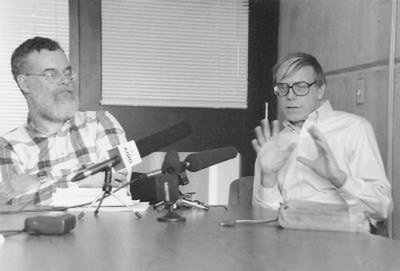April 25, 2002
Green and Olson to receive Gairdner Awards
Two of the eight winners of Gairdner International Awards for 2002, announced in Tornoto Tuesday, are faculty members in the UW School of Medicine.
Dr. Philip Green, professor of genome sciences, adjunct professor of computer sciences, and an investigator for the Howard Hughes Medical Institute, and Dr. Maynard Olson, professor of genome sciences and of medicine and director of the UW Genome Center, will receive the awards. Olson is also an adjunct professor of computer sciences.
All of the eight international award winners, plus Dr. James Watson, who will receive a special international Award of Merit, will receive the prizes, carrying a value of $30,000, at a banquet in Toronto Oct. 24.
The Gairdner Foundation awards are considered among the most prestigious in medical science. Since 1959, 56 of the 255 scientists receiving them have gone on to win Nobel prizes. In general, the awards recognize “outstanding contributions by medical scientists whose work will significantly improve the quality of life.” This year, all of the awards were given for work in genomics research. Genome Canada, a non-profit national corporation, is the lead sponsor.
According to the citations released by the Gairdner Foundation, Olson is honored as one of the early architects for the Human Genome Project for “His original concepts, and for technological and experimental innovations that were critical for the sequencing of the mammalian genomes.” The foundation also noted that he played a central role in laying the conceptual and technical foundations for the Human Genome Project and established the paradigm and the technologies for the physical mapping of complex genomes.
Green’s citation, in the category of bioinformatics, is for “His contributions to development of the computational tools essential for sequencing of the human genome.” The foundation notes that “Dr. Green developed a software package critical to the advance of DNA sequencing where success depended on combining a variety of algorithmic innovations with rigorous focus on the entire life cycle of the data—from laboratory instrument to Genbank submission. Further, he provided compelling early evidence for a dramatically reduced number of human genes.”
Green and his coworkers developed the widely used computer programs called Phred, Phrap and Consed, which are used in assembling, editing and checking the accuracy of genome sequences, and Genefinder, which is used to identify genes within the sequence.
He joined the UW faculty in 1994, coming from Washington University in St. Louis, where he had also worked with Olson. Green earned a bachelor’s degree from Harvard University and a Ph.D. in mathematics from the University of California, Berkeley. He was at the Institute for Advanced Study in Princeton, Columbia University, the University of North Carolina in Chapel Hill, and Collaborative Research, Inc. near Boston before he went to Washington University in St. Louis in 1989. He came to the UW as a member of the molecular biotechnology department, which merged with genetics to create the Department of Genome Sciences last year. He became a member of the National Academy of Sciences in 2001.
Olson graduated from the California Institute of Technology and earned his Ph.D. in inorganic chemistry from Stanford University in 1970. After five years at Dartmouth, he changed his emphasis to molecular genetics and came to the UW to work with Dr. Benjamin Hall in the Department of Genetics. In 1979 he moved to Washington University in St. Louis, where he began to work on the development of systematic approaches to the analysis of complex genomes. In 1992 he received the Genetics Society of America Medal for outstanding contributions during the previous 15 years. The same year, he moved back to the UW. He is also a member of the National Academy of Sciences, elected in 1994. He has been a member of several national advisory committees on human genome research.
The other six winners of the Gairdner International Awards this year are Dr. Eric Lander of MIT’s Whitehead Institute, Sir John Sulston of Sanger Centre in England, Dr. Craig Venter of the Institute for Genomic Research in Rockville, Md., Dr. Michael Waterman of the University of Southern California in Los Angeles, Dr. Robert Waterston, chair of genetics at Washington University in St. Louis, and Dr. Jean Weissenbach, director of the French national sequencing center in Paris.

